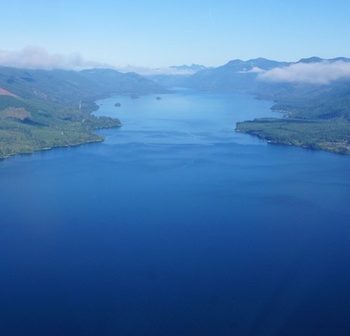
2018 Year in Review
- Posted by Compass Resource Management
- On January 15, 2019
2018 was another fantastic year at Compass. It was a year that saw us doing more of the things we’re known for and love to do. It also saw us moving in some new and exciting directions. Here are some highlights:
Recovery planning in large rivers, lakes and estuaries continues to be a strong practice area for us. We find ourselves increasingly focused on integrating large-scale adaptive management with collaborative structured decision making – and if we can do it with less jargon, all the better! Highlights include:
- Developing a decision-focused framework to guide the recovery of pallid sturgeon in the Platte River, USA.
- Developing an SDM framework and methods to prioritize actions to improve resiliency of the endangered California Delta Smelt in the Sacramento-San Joaquin River Delta.
- Achieving a key milestone in our longstanding decision support work for recovery efforts on the Missouri River Recovery Program – a federal Record of Decision for the EIS.
- Helping stakeholders reach consensus-based recommendations at BC’s Cowichan Lake to deal with long-standing water use conflicts.
Health and risk analysis is a growing area at Compass. We are increasingly involved in supporting risk analysis and decision making with respect to climate change adaptation, chemical alternatives assessment, emerging risks, and environmental pollution:
- We worked with materials scientists, toxicologists, and product managers from industry, government, and NGOs to test the use of various decision analysis tools for selecting safer alternatives to toxic chemicals in consumer products. With a journal publication in the works, we hope to share our findings widely to help improve the quality of chemical alternatives assessment, trade-off analysis, and decision making in industry and government contexts.
- Compass Associate Christian Beaudrie wrapped up his tenure as president of the Decision Analysis and Risk Specialty Group at the Society for Risk Analysis (SRA), where he organized 12 symposia with over 40 speakers on climate change risk and adaptation, risk perceptions and decision making, and chemical alternatives assessment at the SRA Annual Meeting in December.
- Compass was also involved in supporting the Engineering Change Lab (a project of Engineers Without Borders Canada) to train engineers and managers in the use of decision analytic techniques to promote ‘technology stewardship’ within the engineering profession. The goal of this work is to help engineers recognize the complex implications that both traditional and emerging technologies have for society and to ensure that innovations don’t pose unintended and unacceptable risks.
Urban infrastructure continues to be a growth area for us. We see a real opportunity to make a meaningful difference on the urban sustainability front:
- Providing decision support for large infrastructure decisions – 2018 was marked by the start of construction for the North Shore Secondary Waste Water Treatment Plant as well as the start of more decision support work for the Iona Secondary waste water facility.
- Developing and facilitating the evaluation framework to support the work of the Independent Commission on Mobility Pricing in Metro Vancouver.
- Developing methods for quantitatively evaluating fairness and equity in transportation planning alongside more traditional evaluation metrics such as economic benefits, road congestion and transit ridership.
- Developing a planning framework for the City of Vancouver to evaluate the implications of sea level rise risk mitigation options and explore values and risk tolerances related to flood damage.
Reconciliation, UNDRIP and shared decision making. This is undoubtably the future of resource management in many parts of the world, and here in BC we are at the forefront. We are fortunate to be a small part of a big movement, including:
- Supporting a range of innovative water and land management pilot projects with First Nations, and provincial and federal agencies with the goal of meeting the principles of the United Nations Declaration of the rights of Indigenous Peoples (UNDRIP).
- Facilitating and advising the G2G Nicola Forum, in which the Nicola Chiefs and the provincial government have committed to work together in a government to government partnership to sustainably manage water resources in the Nicola watershed.
- Working on an innovative collaboration between the Governments of Canada and BC and Coastal First Nations to develop a network of coastal MPAs from Alaska to Vancouver Island.
- Developing methods and facilitating discussions leading to the development of a Nation to Nation data sharing framework for coastal First Nations.
Land-based planning and species recovery. Competing uses for land resources often underlie the most complex of multi-stakeholder, multi-objective process challenges. 2018’s highlights for us include:
- Supporting the provincial government in their planning for endangered species and ecosystems in a world of limited resources.
- Helping coordinate and facilitate engagement with nearly 20 First Nations and Indigenous governments, Federal and territorial government agencies, NGOs, and industry representatives to develop a broadly supported range planning approach for boreal caribou across the NWT.
- Helping a group of Greater Sage-grouse biologists to produce structured estimates of outcomes from releasing captive-raised grouse to augment the wild population in Canada.
Our exploration of web-based decision tools really took off this year. Our web-app development team has made steady progress in bringing Compass’ many decision support tools to the web, while creating new and innovative tools to support analysis and decision making for our clients.
Highlights include:
- Our trademark Structured Decision Making tool is now on-line! This decision support tool is currently being used to help groups quickly parse through complex alternatives, clarify what matters, and reach agreement on priorities and preferences. We will be rolling out the new tool (and new branding) in the coming months. Stay tuned!
- Our interactive “impact pathways” tool allows users to map out impact hypotheses, summarize supporting information, characterize uncertainties, and set priorities for research, monitoring, and adaptive management actions. This tool provides an intuitive and interactive graphical display and functional database that enables groups to build a common understanding of uncertainties and set priorities. This tool is already in use for multiple projects, and we see a bright future ahead!
- We are currently developing innovative data visualization tools to help stakeholders and decision makers turn complex hydrological data into a shared understanding of effects.
Global challenges – ecological, social, and political – have felt daunting at times in 2018. We remain passionate and hopeful. As always, we’re committed to helping good people make good choices so we can all enjoy a better future.
To learn more about the services we provide click here. To see more projects click here.



0 Comments